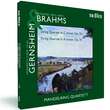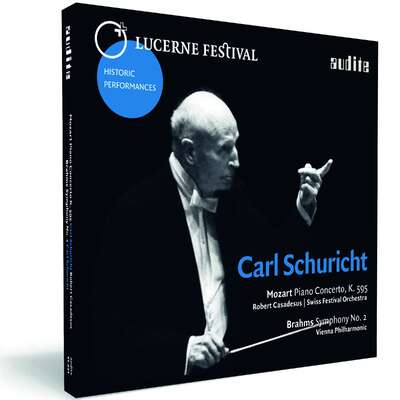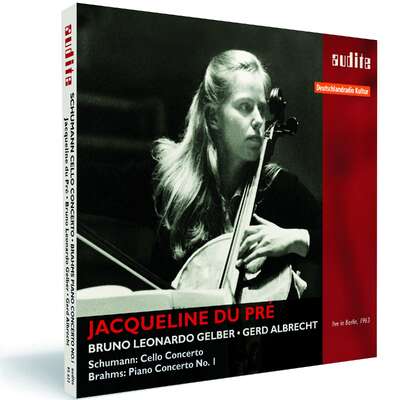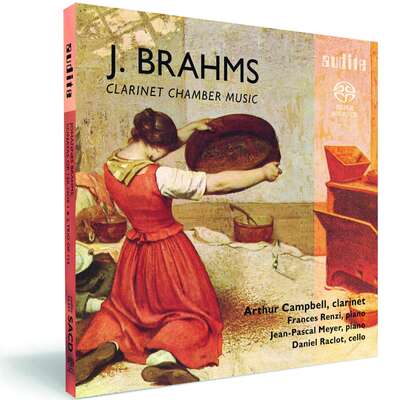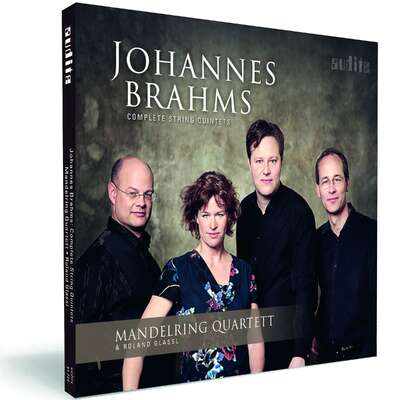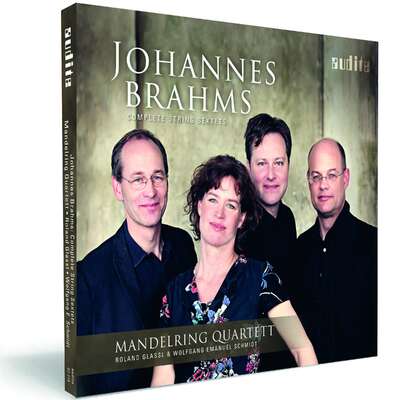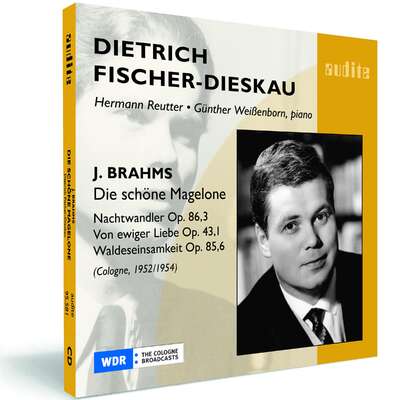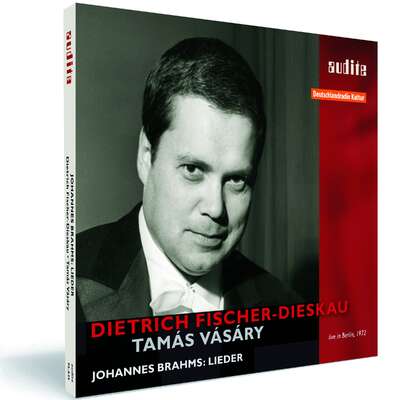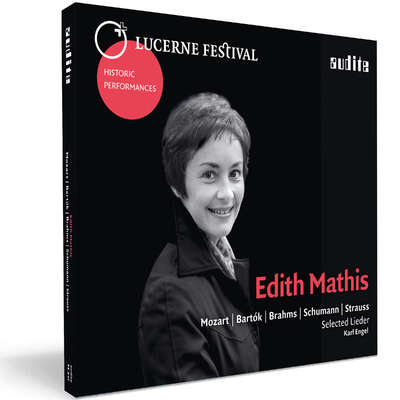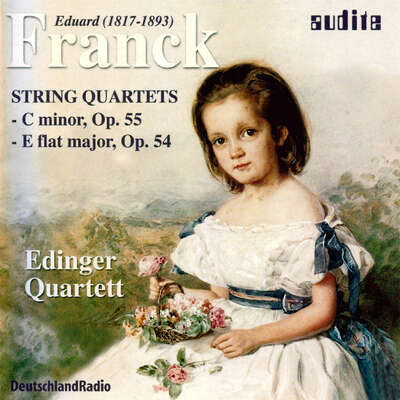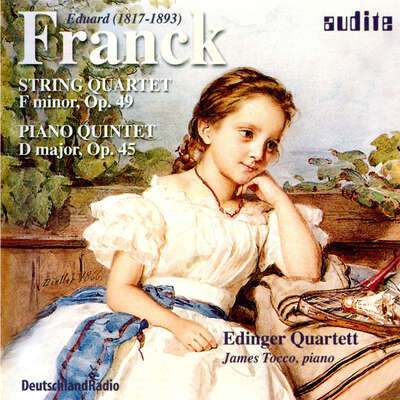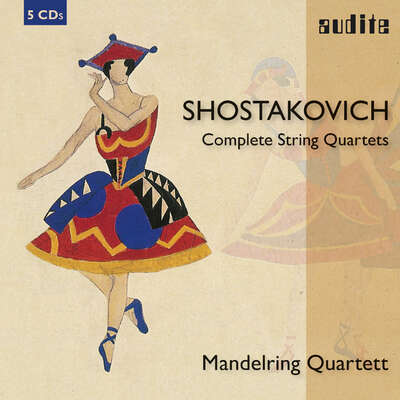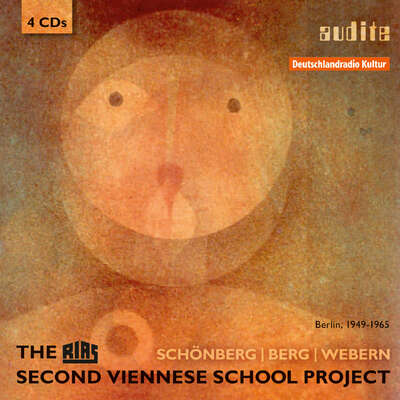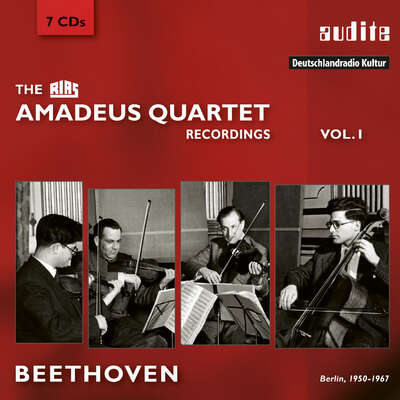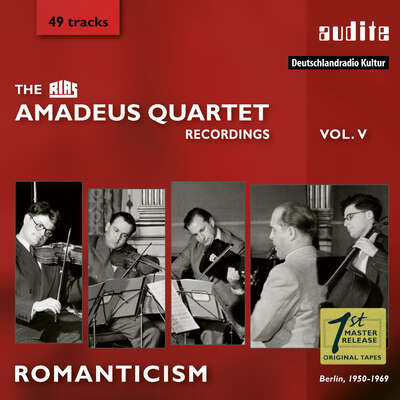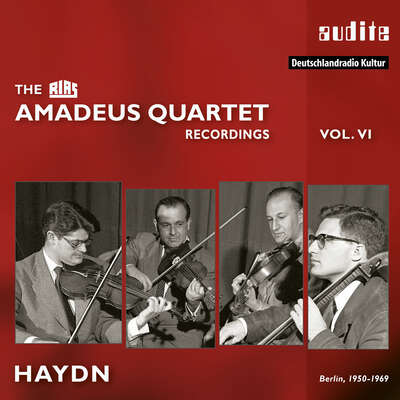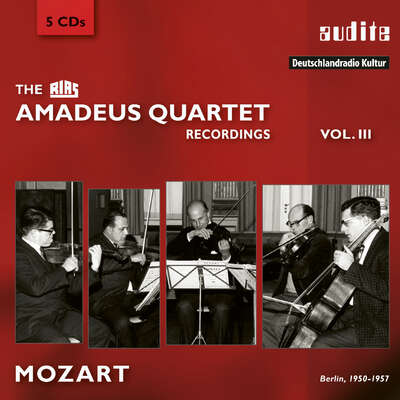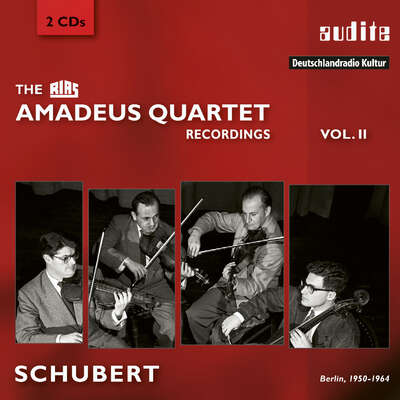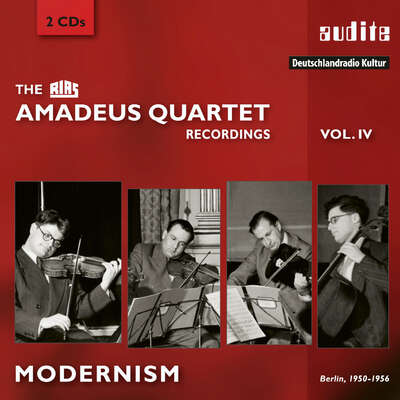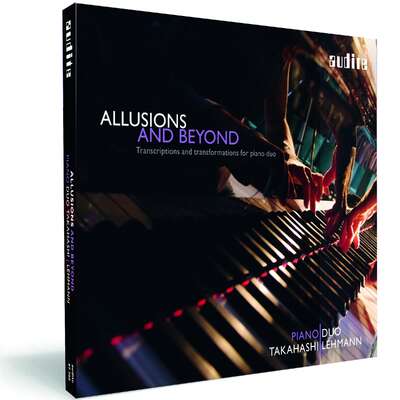
"It is not difficult to compose. But it is incredibly difficult to cast aside the superfluous notes." (Johannes Brahms) This quotation of Brahms shows his self-critical attitude towards his own compositions. During his whole life Brahms dedicated himself to the central genres of...more
"The gifted Mandelring Quartet play this delightful work with such unfailing sensitivity and enraptured affection (not to say technical aplomb) that you’d have thought it was central repertoire they’d been playing for years." (The Strad)
Details
| String Quartets by Brahms (Op. 51, No. 1) & Gernsheim (Op. 31) | |
| article number: | 97.503 |
|---|---|
| EAN barcode: | 4022143975034 |
| price group: | BCA |
| release date: | 1. September 2004 |
| total time: | 64 min. |
Bonus Material
Informationen
"It is not difficult to compose. But it is incredibly difficult to cast aside the superfluous notes."
(Johannes Brahms)
This quotation of Brahms shows his self-critical attitude towards his own compositions. During his whole life Brahms dedicated himself to the central genres of instrumental music - the symphony and the string quartet. As in the case of his First Symphony, he only published his first two string quartets relatively late. When they appeared in 1873 they were soon praised by the critics.
The First String Quartet in C minor is deeply serious and marked by restless agitation, tension and energy. The compositional-technical standards of this demanding genre contribute to the work's emotional concentration. The Quartet is not comfortable for the listener, but requires a certain effort on his part to discover the particular fascination of the work as a whole. "Beauty cannot always be easy" (Hermann Deiters).
The Brahms contemporary Friedrich Gernsheim corresponded with Brahms; their not very extensive exchange of letters bears witness to the mutual appreciation for each other shared by the two musicians. The composer, conductor and teacher Gernsheim, a graduate of the Leipzig Conservatory, left behind an extensive oeuvre in which - as with Brahms - only the genre of opera is missing. His Second String Quartet in A minor appeared just two years after Brahms's string quartets and a comparison between the works in no way shows the younger composer at a disadvantage. One finds the same seriousness, the same sure mastery of form and the same relationship to the great tradition of the genre. In the artistic development of his ideas and the sovereign use of the string quartet's sound possibilities, Gernsheim is in no way inferior to Brahms. The combination of the two works on one recording allows anyone to make a stimulating comparison.
The Mandelring Quartet (Sebastian and Nanette Schmidt, violins, Michael Scheitzbach, viola, and Bernhard Schmidt, violoncello), ARD Competition winners, founders and directors of the Hambach Music Festival, dedicate themselves regularly to the works of unknown composers and unusual instrumental combinations alongside the familiar quartet literature.
Reviews
classiqueinfo-disque.com | mardi 9 décembre 2008 | Vincent Haegele | December 9, 2008 Brahms et quelques consorts
Brahms n’a pas été un compositeur de quatuors à cordes commeMehr lesen
Das Orchester | 9/2008 | Georg Rudiger | September 1, 2008
Bis vor einigen Jahren war Friedrich Gernsheim nur MusikwissenschaftlernMehr lesen
Muzyka21 | 1 (90) – styczeń 2008 | Stanisław Lubliński | January 1, 2008
Prezentowane trzy nagrania stanowiące jeden cykl powinny mieæ wspólnyMehr lesen
Neue Musikzeitung | nmz 2007/11 | Seite 42 | 56. Jahrgang | November | Hanspeter Krellmann | November 1, 2007 Zeitgenossenschaft
Generations-Angehörige innerhalb einer Epoche bilden, auch wenn sie ohneMehr lesen
www.musicweb-international.com | October 2006 | William Kreindler | October 1, 2006
The Mandelring Quartet is formed around the members of the Schmidt family, Sebastian and Nanette, violin and Bernhardt, cello. On the presentMehr lesen
Gernsheim was six years younger than Brahms and occupied successively more important positions as a conductor and pedagogue in Cologne, Rotterdam, and Berlin, where he died in 1916. In all of these positions he was a strong promoter of the music of Brahms. As a composer he wrote a lot of orchestral music, including four symphonies that have been recorded as a set on Arte Nova conducted by Siegfried Kohler, as well as concertos, choral works and much chamber music. Although on the surface a minor Brahmsian character he possesses a personality of his own and a geniality that Brahms sometimes lacked. Gernsheim wrote five string quartets, of which the second, in A-minor, is recorded here. It was published in 1875 and shows some influence of the Brahms Op. 51 quartets written two years earlier.
In comparison to the Brahms quartets, the Gernsheim A-minor has both more rhythmic push and more serenity. The development in the first movement is well done, if not fascinating, and the composer shows great imagination in the use of tonal relationships. The recapitulation is ably done. The second movement is in D-flat major and again Gernsheim handles tonal relationships well. The second section of the movement and the overall development impressed me more than anything else in the entire work, especially at 6:30 through to the end of the movement. The scherzo struck me as too Brahmsian, although the trio was much more individual and another highlight of the whole work. The quasi-rondo final movement features a recap of the opening material from the first movement and strains at the bonds of the home key. It also strains at the boundaries of chamber music and almost seems to require an orchestral texture in its last minutes. In all, a work not deserving of the obscurity it has received in the last century.
The three Brahms string quartets are well-known and well-recorded, although they have not received the affection accorded some of the other Brahms chamber works such as the piano trios or the piano quintet. The Op. 51, #1 is a tightly constructed work with the opening material generating all that comes after it. At the same time the piece thrives on counterpoint, frequently to the exclusion of all else. The Mandelrings begin at too brisk a tempo for my taste, but settle down before an excellent playing of the recapitulation. They are fine in the lovely and tentative slow movement, with it’s intricate counterpoint, and continue so in the third movement, with fine work by the violist. They do best with the feverish fourth movement, sustaining the tempo, the atmosphere and the counterpoint steadily throughout the movement. This is their finest playing on the disc.
It may have been noticed that while I spoke of the performers’ playing as a whole, I hardly mentioned any solo work. This is not accidental - the Mandelring plays as such a cohesive unit that one hardly notices individual players. All are fine when called upon individually, but it is the total sound of the group that one remembers. Perhaps this is to be expected from a quartet where three of the four instrumentalists have been playing together since infancy and where all four members are devoted to playing chamber music almost exclusively. In any event, it works very well in most of the Brahms, although there were times in both composers’ quartets where I felt that the Mandelrings sacrificed tempo control for smoothness of ensemble. I would say that this is the factor the quartet most needs to address.
All three of the discs in this series were recorded as part of the Mandelring’s own Hambacher Festival in the St. Bartholomäus-Kirche in Birkweiler in the southern Rhineland. The church lends itself better to the sound of the Brahms than the Gernsheim, but the presumably live performance mikes both works much too closely. There is also some smudging of the individual lines in certain passages in the Brahms. The close ensemble sound of the Quartet is not always well served by the acoustic in the church which sometimes blunts what should be a taut sound. However, any sonic imperfections are outweighed by the chance to hear a more than interesting quartet by a friend of Brahms. I look forward to the other two recordings in this series.
Pforzheimer Zeitung | Thomas Weiss | August 24, 2006 Brahms und Gernsheim
Die Kategorisierung als Kleinmeister oder gar Epigone ist gefährlich undMehr lesen
Frankfurter Allgemeine Zeitung | Nr. 145/2005 | Ulrich Schreiber | June 25, 2005 Leiser loben – Quartette von Johannes Brahms und Friedrich Gernsheim
Vor sechs Jahren unterstützte das österreichische Label Lotus eine vomMehr lesen
Classica-Répertoire | mai 2005 | Antoine Mignon | May 1, 2005
Coupler chaque quatuor de Brahms avec (deux autres volumes sont à venir)Mehr lesen
Scala | Mai 2005 | Ingo Wackenhut | May 1, 2005
Romantische Weinstraße
Das Mandelring Quartett mit Brahms und Gernsheim – Der CD-Tipp
„Brahms & Contemporaries“ nennt sich ganz international eineMehr lesen
Diapason | Mai 2005 | Jean Cabourg | May 1, 2005
Le Quatuor Mandelring, auquel nous devons une notable intégrale Onslow et, déjà, un Quintette de Brahms, s'est voué depuis quelques années àMehr lesen
Scherzo | n°196 (abril 2005) | J.A.G.G. | April 1, 2005
Buena realización a cargo del Mandelring de este magno cuarteto de madurezMehr lesen
Fono Forum | 2/2005 | Dr. Michael Kube | February 1, 2005 Erstrangig
Hört man das Streichquartett von Friedrich Gernsheim (1839-1916), so traut man seinen Ohren nicht. Warum macht man mit einem so erstrangigen undMehr lesen
The Strad | February 2005 | Julian Haylock | February 1, 2005
This is the first in a series of three quartet discs recorded withMehr lesen
Bayerischer Rundfunk | Januar 2005 | Friedemann Leipold | January 4, 2005
Streichquartett-Formationen, hat jemand mal so treffend gesagt, sind meistMehr lesen
Stereoplay | 1/2005 | Martin Mezger | January 1, 2005
Das Mandelring Quartett hat Brahms' erstes veröffentlichtesMehr lesen
klassik.com | Dezember 2004 | Manuel Stangorra | December 30, 2004 | source: http://magazin.k... Brahms durchdekliniert
Die Vier vom Mandelring-Quartett zählen zu den erlesensten Musikern ihrerMehr lesen
Classix | #11 2004 | Teresa Pieschacón Raphael | December 1, 2004
Wer war Friedrich Gernsheim? Kaum ein Konzertführer kennt den aus WormsMehr lesen
Ensemble - Magazin für Kammermusik | 6/2004 | Hans-Dieter Grünefeld | December 1, 2004 Skepsis und Poesie
Das Klangmodell einer tief schürfenden Sinnkrise hat Johannes Brahms inMehr lesen
Pizzicato | 11/2004 | Alain Steffen | November 1, 2004
Dies ist die erste von insgesamt drei vorgesehenen Veröffentlichungen, wo sich jeweils ein Streichquartett von Brahms und ein Quartett eines seinerMehr lesen
Wenn Gernsheims Quartett auch kaum neue Aspekte zeigt, so ist dieses Werk doch ein künstlerisch wertvolles Stück, das durch spannungsvolle Momente, ausgearbeitete Melodien und eine gut ausbalancierte Struktur für sich einnimmt. Wer Brahms mag, der wird auch dieses Quartett von Gernsheim mögen, obwohl, und das muss man sagen, der Einfluss von Brahms stets hörbar ist.
Was diese CD aber über den rein interessanten Aspekt weit heraushebt, das ist die Interpretation des Mandelring Quartetts. Selbst wer die großen Aufnahmen der Brahms-Quartette kennt – und davon gibt es ja viele! –, der wird in dem Spiel des Mandelring Quartetts so manch Neues entdecken. Wenn auch sehr traditionsbewusst musiziert wird, so gelingt es den vier Musikern dank einer hervorragenden Aufnahmetechnik, jedes Detail hörbar zu machen. Man kann praktisch parallel die vier Stimmen verfolgen und erkennen, wie genial Brahms dieses Quartett auskomponiert hat. Darüber hinaus verleihen die Musiker dem Werk durch ihr engagiertes und lebendiges Spiel eine Leichtigkeit und Offenheit, die sich der üblichen und etwas träg wirkenden Romantik positiv entgegenstellt. Die Interpretation wirkt geschlossen, besitzt ungeheuren Drive und begeistert ebenso durch rhythmische Prägnanz wie durch verträumte Innerlichkeit. Was will man mehr, insbesondere, da hier alles frischer, neuer und interessanter klingt als gewohnt. All diese Charakteristiken kann man getrost auch auf das Quartett von Gernsheim übertragen, das somit stilistisch ungemein aufgewertet und das durch die wunderbare Arbeit des Mandelring Quartetts durchaus konkurrenzfähig wird. Zwei bravouröse Leistungen, die wir mit der Bestnote belohnen.
klassik-heute.com | Oktober 2004 | Robert Spoula | October 22, 2004
Wohl durch Brahms hat die Gattung Streichquartett in der zweiten HälfteMehr lesen
Kleine Zeitung | Sonntag, 17.Oktober 2004 | TSC | October 17, 2004
Quartett spielen ist für die deutschen Streicher „ein Traumberuf“.Mehr lesen
Hessischer Rundfunk | Mittwoch, 13.10.2004 | Dr. Gerhard Splitt | October 13, 2004
Zwei Streichquartette sind auf unserer CD des Tages, nämlich dasMehr lesen
Die Rheinpfalz | Nr. 238/2004 | Uwe Burkert | October 12, 2004
Eine Entdeckung
Mandelring Quartett spielt Brahms und Gernsheim
Was als Reihe „vis-à-vis“ begann, wird nun unter „Brahms &Mehr lesen
Strings Magazine | April 2005 | Edith Eisler | April 1, 2004
Formed in Neustadt, Germany, by Sebastian, Nanette, and Bernhard Schmidt, the Mandelring Quartet takes its name from the almond-tree-rich districtMehr lesen
Their new three-volume project combines Johannes Brahms with Heinrich von Herzogenberg, (Felix) Otto Dessoff, and, on this record, Friedrich Gernsheim (1839-1916), an unknown but excellent and prolific German composer, pianist, conductor, and teacher. Though pairing a towering genius' masterpieces with works of his lesser contemporaries seems hazardous, Gernsheim's quartet holds its own: grandly conceived, clearly structured, texturally full-blooded but not dense, rhythmically pungent and original, it is ardently romantic. This is music that is lush, dramatic, intense, and abounding with beautiful, lyrical melodies and rich harmonies. The playing throughout is first-rate, fully equal to all technical demands, tonally warm, homogeneous and clear, deeply felt and expressive. Gernsheim could not have wished for more persuasive advocates. The Brahms is brilliant, expansive, sustaining drama, exhibiting drive and tension without haste.
The record is an admirable, welcome addition to the Romantic discography.
